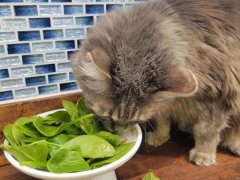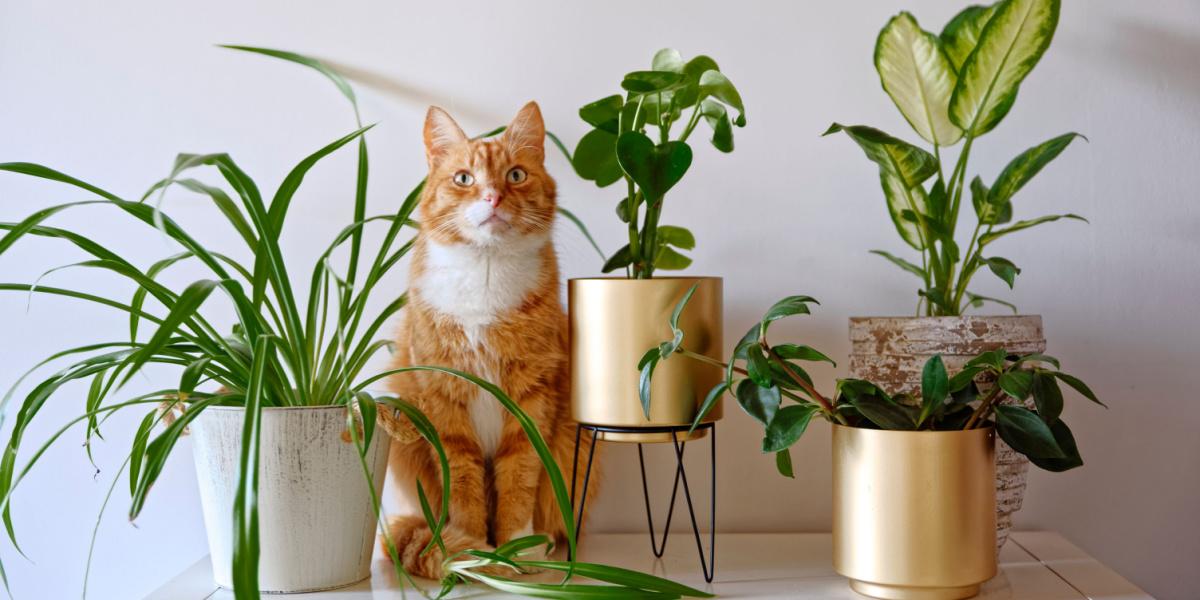
Cats are naturally very curious animals and will often try to investigate indoor plants, especially if they smell interesting or have unusual textures. Indoor houseplants are also intriguing for cats and large dangling fronds or leaves can be seen as enticing things to play with.
Cats sometimes like to eat, dig, or knock over indoor plants. Cats might investigate house plants because they’re curious, bored, or feeling playful. There are lots of ways to keep your cats out of indoor plants, including leaving citrus peels or pieces of aluminum foil peel around the base of your plant.Key Takeaways
But if your cats are making a habit of bothering your houseplants or you’re worried that they might be harmed by houseplants that are toxic to cats, it’s vital to keep them from getting into your indoor greenery. Read on to find out the top 10 ways to keep cats out of indoor plants.
How to Safely Keep Cats Away From Plants
1. Use Citrus
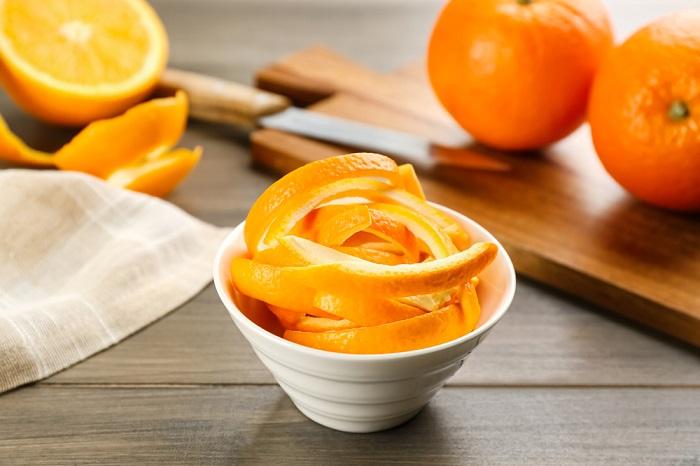
Cats dislike the smell of citrus, so peels can be an effective deterrent.
This is a great natural way of deterring your cat. Cats usually hate the smell of citrus. Try leaving lemon or orange peels around the base of your plant or around the top of your plant pot. Lemon peels won’t do any harm to your cat if they ingest them, so they’re safe to use and often a very effective deterrent.
If you don’t want citrus peels all over your plants, you could even just spritz lemon juice onto your plant pot, around the base of your plants, or all over the leaves with a small spray bottle.
Also Read: Can Cats Eat Oranges?
2. Cat Deterrent Spray
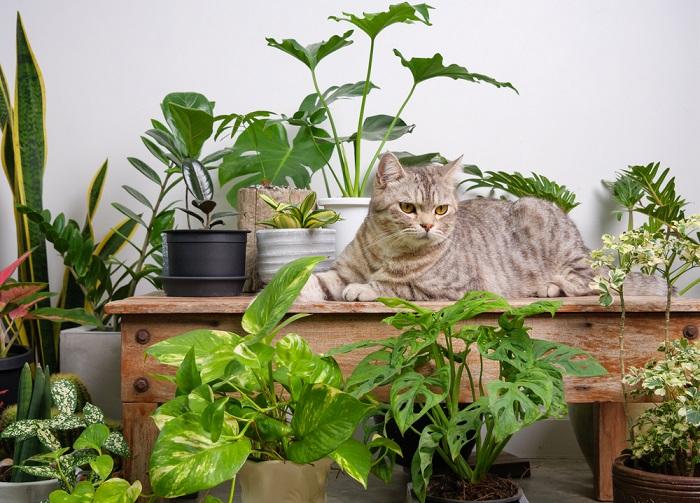
Cat-repellent sprays contain ingredients that cats find unpleasant.
A less natural but sometimes still very effective way of stopping your cat from getting into your houseplants is using a commercial cat-repellent spray. Use one that is safe for plants and you can spray it all over the plant pot as well as the plant leaves and stalks.
Also Read: 10 Hacks To Keep Cats Away From Plants
3. Sprinkle Pine Needles
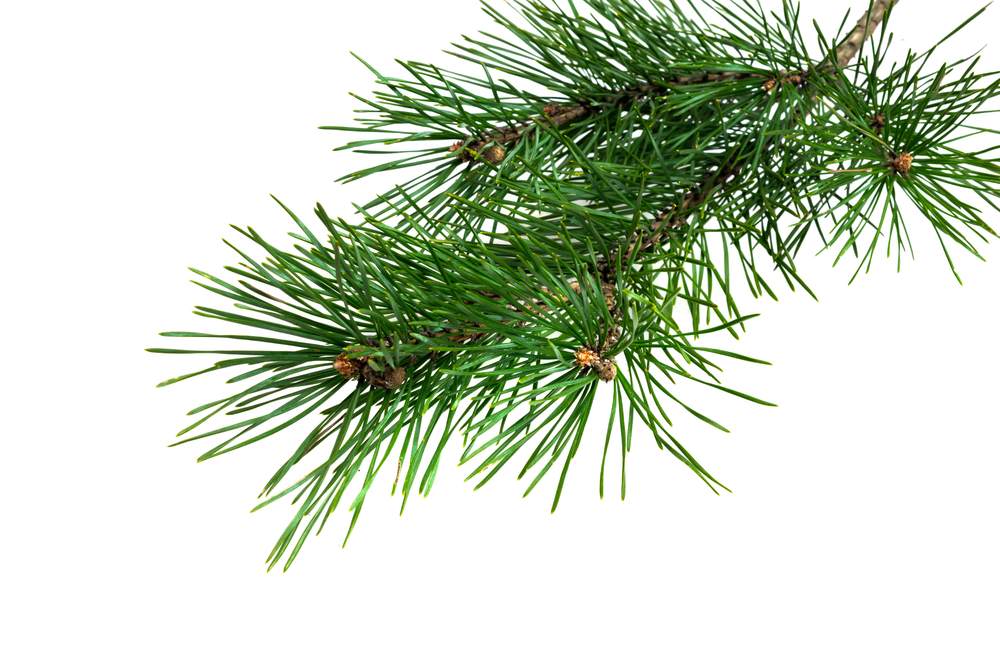
Pine needles look natural in your potted plants but cat’s don’t like the smell.
Sprigs of pine needles look very natural when sprinkled around your plants on top of the soil, keeping a nice neat aesthetic. Most cats dislike the smell, so it should hopefully stop them from digging your plants up or scratching at them.
Also Read: 10 Toxic & Poisonous Plants For Cats
4. Place Your Plants Out Of Reach
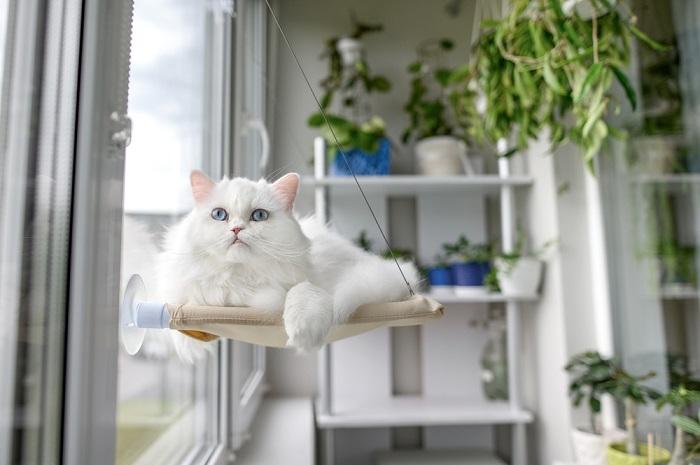
Hanging planters or inaccessible shelves can keep plants safe from curious cats.
Although cats can be very athletic and are extremely good at jumping and climbing to high places, try placing plants in inaccessible places for your cat. A good option is hanging your plants from windows or ceilings in hanging planters. Alternatively, place them on high shelves with no nearby furniture for your cat to use as a ladder.
Also Read: Best Cat Window Seat & Perches
5. Place Cat Deterrent Objects Inside Potted Plants
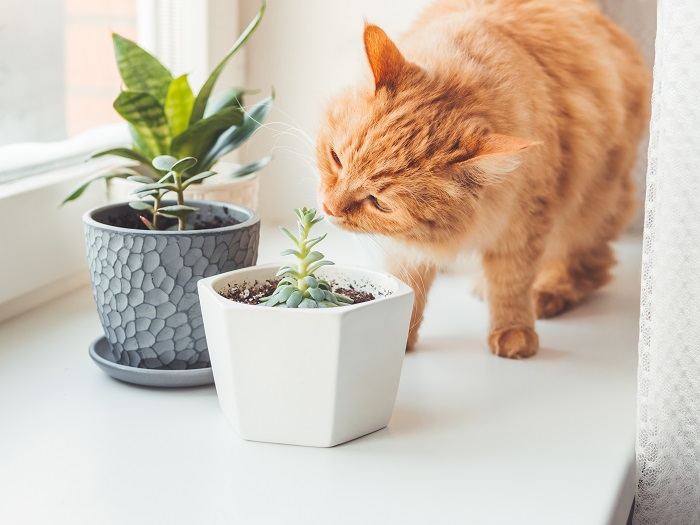
Aluminum foil or seashells might deter cats from digging around in the soil.
You can try placing a number of different objects in the pot, including aluminum foil, pine cones, plastic forks, and seashells. You could even repot your plants in clay pebbles if your cat likes digging in the soil.
If you want to use tin foil, you can either cover the plant pot with it or place it around the base of the plant. You could try using double-sided tape to hold it in place well. Alternatively, place plastic forks into the soil with the prongs facing up.
6. Make Sure Your Cat Isn’t Bored
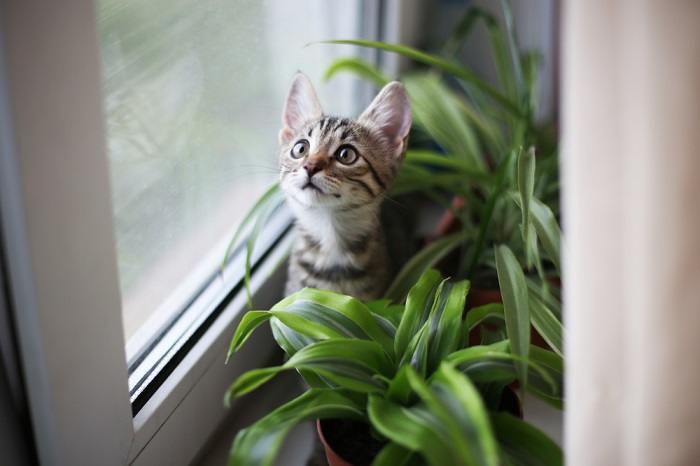
Offer more play time and exercise throughout the day so your cat is too tired to bother the plants.
If your cat is getting into your houseplants because they are bored, encourage more frequent play sessions with them during the day to tire them out and keep their brain engaged on something else.
Distract your cat from your plants with puzzle feeders or new toys to chase. This way your cat gets to have quality time with you and gets exercise and engages their brain.
Also Read: Is My Cat Bored? 8 Signs to Watch Out For
7. Use Catnip Around The House
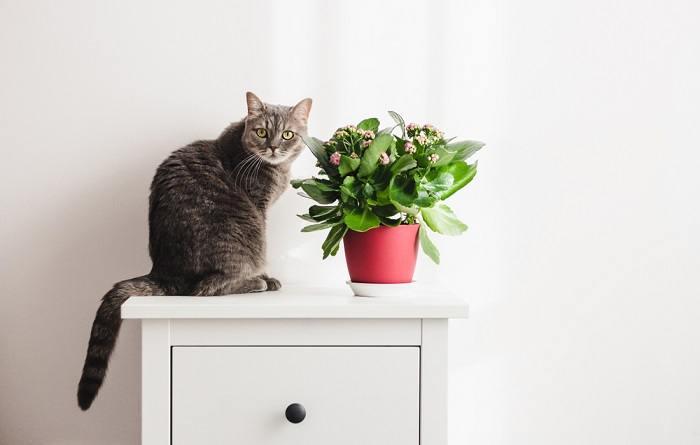
If your cat is always drawn to a certain plant, place catnip on the other side of the house to distract them away.
To distract your cat away from your potted plants utilize catnip very strategically. Put small bits of catnip around the house or yard away from your indoor plants so that your cat associates good things in areas of the property that don’t have house plants.
Also Read: The 5 Best Catnip Products For Cats (Spray & Toys and More Surprises)
8. Train Them to Leave Your Plants Alone
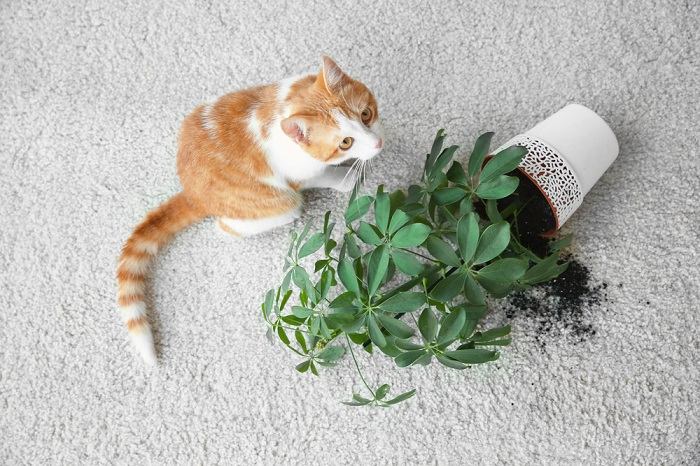
It’s possible to train cats to leave your plants alone if you are home a lot to enforce the rules.
This is only possible to do if you’re around the house a lot of the time with your cat so you can watch them closely. If you notice your cat going for your houseplants, distract them away from the plant immediately with toys or treats. Immediately praise them when they turn their attention away from the plant.
If this isn’t working, you could incorporate a firm “no” when they go to pester your plants. If they turn away, vocally praise them and you could give them a treat. This has to be very consistent and can take a while for them to get out of the habit so be patient.
Also Read: Why Do Cats Knock Things Over?
9. Grow Prickly Plants!
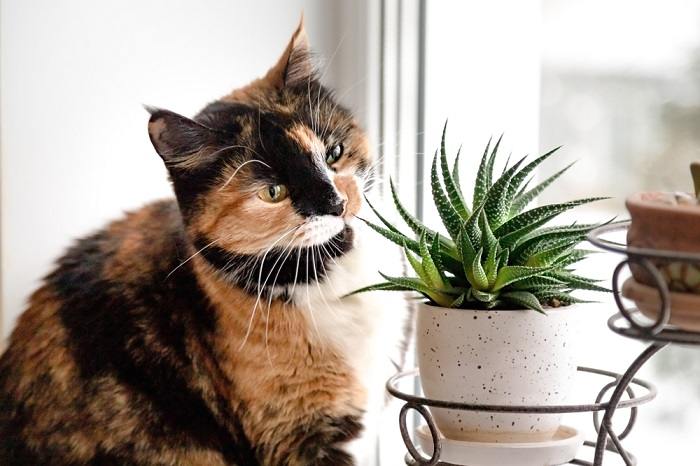
Cats won’t want to mess with plants that are prickly, uninteresting, or bad smelling (to them).
The type of plants you keep in the house can also act as deterrents in themselves. Cats aren’t going to want to mess with prickly cacti or succulents and actually also dislike the scent of lavender and eucalyptus. You could strategically place these near or in front of your other indoor house plants to cat-proof them, or keep it basic and only keep these.
Also Read: Do Cats Like and Understand Kisses?
10. Give Them Their Own Plant
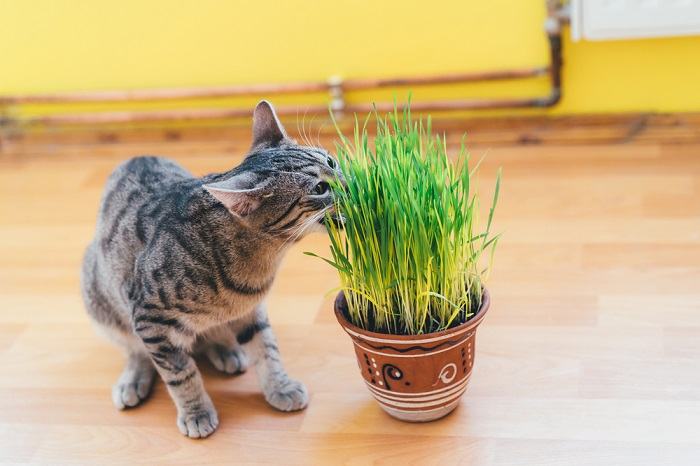
Offering your cat safe greenery to nibble such as cat grass can keep them away from your other plants.
Cat grass (commonly one or more grasses such as oat, rye, barley, and wheat) is a safe plant to grow for your cat to enjoy, whether sitting in it, nibbling at it, or smelling it. There are a number of reasons why cats love cat grass. It’s thought to aid good digestion and engages indoor cats in behaviors they’d do in the wild or outside.
You can buy pre-grown grass online or even grow kits to try and DIY it at home.
Also Read: Why Do Cats Eat Grass?
There are lots of ways to stop your cats from getting to your indoor plants listed in this article and you might need to use a combination of a few to have the desired effect. Don’t be afraid to try out different methods and see which works best for you and your cat.
Using safe natural products can work really well but make sure you’ve checked what your using isn’t toxic to cats. Avoid using cayenne pepper, cinnamon, essential oils, coffee grinds, or black pepper as these are all toxic to cats.
Also Read: What Can You Give A Cat For An Upset Stomach?
Frequently Asked Questions
What can I put in my house plants to keep cats out?
Cats dislike citrus, so you could try leaving lemon or orange peel around the base of your plant. Or mix a lemon juice spray in a bottle and spritz your plant leaves and pot with it. Other items that seem to repel cats are pine cones and aluminum foil.
How do I keep my cat from using my indoor plants as a litter box?
Try replacing the potting soil with pebbles or topping the soil with pieces of lemon peel. Cats will also stop littering on plants that have tin foil or pine cones placed at their base.
How do I stop my cat from attacking my house plants?
You might want to move your house plants to hard-to-access places in the house. For example, use hanging planters that your cats can’t reach. You could also spray the plant with a chemical cat-repellent spray, or lemon juice.

